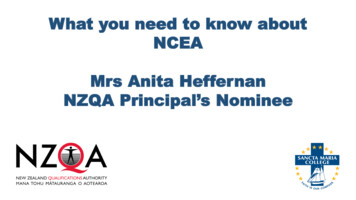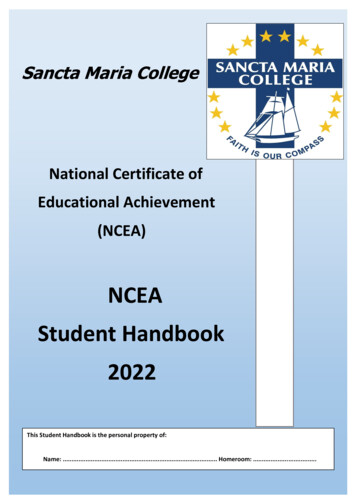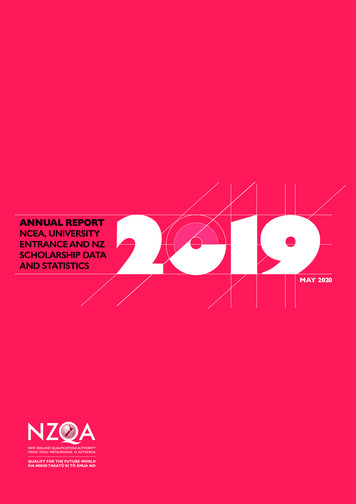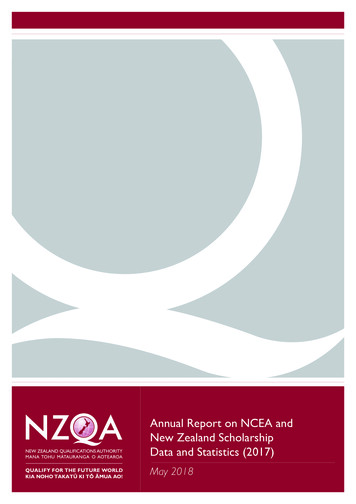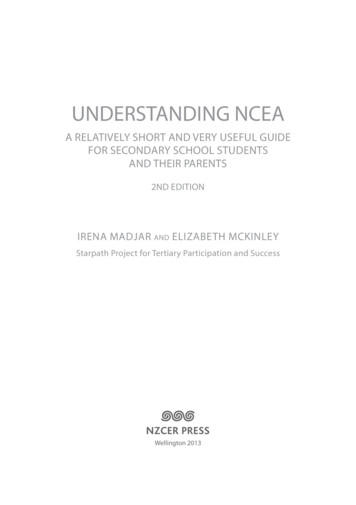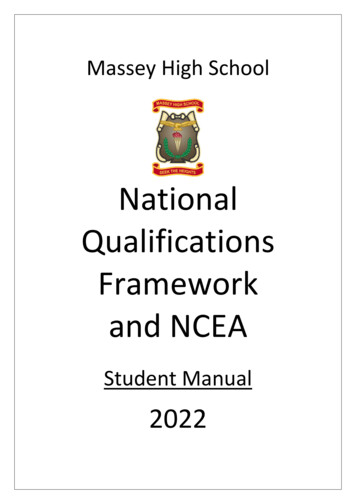
Transcription
Massey High SchoolNationalQualificationsFrameworkand NCEAStudent Manual2022
ContentsPage Introduction. What are NCEA and the NQF?3 Certificates and Endorsement4 Scholarship and UE5 Course Assessment Statement & Assessment Dates6 Assessment Opportunities7 Resubmission8 Not Achieved, Withdrawal of Entry and Missed Assessment9 Authenticity10 Appeal Sheet11 Derived Grades13 Special Assessment Conditions14 How Parents/Caregivers can help15 Personnel162
INTRODUCTIONThis manual includes general information about NCEA procedures including fees and financial assistancedetails for 2022.In addition to this manual students will receive a Course Assessment Statement for each of their coursesof study from the Learning Leader or Teacher-in-Charge of the course. This statement will include adetailed listing of the standards offered to be assessed, the general time allocations for the course, andthe dates, times and locations for sitting or handing in of assessments.WHAT ARE NCEA AND THE NQF?NCEA (National Certificate of Educational Achievement) is New Zealand's main national qualification forsecondary school students and is part of the National Qualifications Framework (NQF). Within the NQFcandidates are assessed against achievement standards or unit standards from the DAS (Directory ofAssessment Standards). Each standard is designed to measure a particular part of the subjectcurriculum and can carry a number of credits.Most subjects at school offer 20 or more credits involving a variety of unit standards or achievementstandards. Students can gain these credits through a combination of internal assessment (tests,assignments and internal examinations throughout the year) and external examinations. Some subjectsare fully internally assessed, while more than half of other subjects may be assessed by externalexaminations.Achievement StandardsFor every achievement standard, students will earn a result of Achieved, Merit, Excellence, or NotAchieved. If a student receives Achieved, Merit or Excellence they will gain the credits for thatachievement standard, i.e. the same number of credits regardless of the result.Unit StandardsSome subjects use unit standards for assessment in addition to or in place of achievement standards.The credits for unit standards count on the NQF in the same way that credits for achievement standardsdo. However, there is generally no Merit or Excellence result for unit standards and students will receiveeither Achieved or Not Achieved. Unit standards are assessed internally. They are not necessarily aneasier option than achievement standards but in some courses they can be a more appropriate meansof assessment for certain topics.3
CERTIFICATESCertificate EndorsementLevel 1, 2 or 3 NCEA certificates can be endorsed with Merit or Excellence according to the followingcriteria:Endorsement with Merit:- requires 50 credits at merit or excellence at the level of the certificate or above.Endorsement with Excellence:- requires 50 credits at excellence at the level of the certificate of above.Course EndorsementAn Endorsement of Merit or Excellence for a course of study can be gained byachieving 14 credits at Achieved, Merit or Excellence in the course with at least 3 ofthe Achieved, Merit, or Excellence credits gained from internal standards and at least3 of the Achieved, Merit or Excellence credits from external standards. Courseendorsement applies only within the year of study of the course. The Achievedcourse endorsement is available from 2021 onwards.Vocational Pathways2 certificate.The Ministry of Education has defined six Vocational Pathway sectors. Thesix are: Primary Industries, Services Industries, Social and CommunityServices, Manufacturing and Technology, Construction and Infrastructure,and Creative Industries. Within each of these sectors at Level 2 there are‘recommended’ standards and ‘sector-related’ standards. If a students’NZQA qualification includes 60 or more credits from within one sector ofwhich 20 or more are ‘sector-related’, and the rest of the 60‘recommended’, then that student will receive a Vocational PathwayAward on their NZQA Record of Achievement, along with their NCEA Level4
New Zealand ScholarshipStudents can also enter subjects for New Zealand Scholarship which can result inmonetary awards. Scholarship is awarded to approximately the top 3% of Level 3candidates.New Zealand Scholarship is not part of the NCEA structure but it provides a substantialchallenge for advanced students. Entry to New Zealand Scholarship should only be considered by suchstudents after careful guidance about choices relating to NZ Scholarship with particular reference toexternal examination scheduling.University EntranceUniversity Entrance (UE) is the minimum requirement to go to a New Zealand university.To gain UE from 2014 a student will need at a minimum:Level 3 orhigherAchieve NCEA Level 3At least 14 creditsin an approvedsubjectAt least 14 creditsin an approvedsubjectAt least 14 creditsin an approvedsubjectLevel 3 orhighertheymust be5 creditsin reading10LiteracyCredits5 creditsin writingLevel 2 orhigherLevel 1 orhigher10 Numeracy CreditsNote 1: Literacy and numeracy credits can be obtained from certain other subjects, as well as Englishand Mathematics.Note 2: The above are minimum requirements and universities such as the University of Auckland mayhave more stringent requirements for many courses. Details can be obtained from the various universitywebsites or from the school Careers Advisors.ResultsDuring the year parents and caregivers will be able to keep informed of each student’s progress fromtheir results in the internally assessed achievement standards and unit standards. These results areaccessible via the KAMAR Parent Portal and also additionally on the NZQA website which is updatedmonthly.All these results and Record of Achievement will be available on the NZQA website (www.nzqa.govt.nz).Students are required to register their login so that entries and results can be checked throughout theyear as well as ordering of certificates once the results for the previous year are confirmed.5
COURSE ASSESSMENT STATEMENTStudents can expect to receive a handout in the form of a one-pageassessment statement for each course of study near the beginning ofeach course. This will be issued to each candidate by the teacher,Teacher-in-Charge, or Head of Department near the beginning of eachcourse, possibly included with a booklet containing other informationabout the course.Each Course Assessment Statement will contain the following:1. Course name, level and duration.2. Course prescription.3. Standards to be assessed, including each registered standard number, the full title of eachstandard, the version number, the level and the number of credits available. (It is theresponsibility of each Head of Department or Teacher-in-Charge of a subject to check theassessment specifications of each standard each year as refinement of specifications is anongoing process.)4. Expected assessment dates or deadlines and locations for submission of work.5. Details of any assessments which include non-replicable tasks, or where further assessmentopportunities may not be practicable.6. A space for the student to record grades.Students are advised to keep their Course Assessment Statements in a safe place, possibly pasted into aworkbook that they will have all year, and to record results of assessments as the year progresses.ASSESSMENT DATESWhile assessment can involve a process of “gathering of evidence” of a student’s work over a period oftime during the year, practicability in a large secondary school necessitates the setting of specific datesfor assessment opportunities and completion of assessment tasks. Dates of assessments will appear inindividual subject NQF Course Assessment Statements for each learning area.Any internal standard work that is produced outside the classroom must be presented for assessmentby the time stated on the due date. The work must have a cover sheet attachedto properly identify the work submitted as well as to validate the date and timethat the student work is handed in. The location for handing in such material willbe advertised to the student(s) by the HOD or Teacher-in-Charge of the learningarea. Work submitted after the due date (and time) will not be eligible forassessment without valid reason (such as a medical certificate) and even thenonly if assessment of the work is practicable. (See notes below under “MissedAssessment”.)For external achievement standards requiring the student to submit work for assessment by a particulardate, the student will be provided with the date.6
ASSESSMENT OPPORTUNITIESStudents need to be aware that their efforts in class work as well as informal assessments may be recognised. Valid evidence of achievement fromany authentic standard-specific work may accrue to a student’s resultespecially if they unavoidably miss an assessment or deadline. (See the latersection headed “Missed Assessment”.) However, for some standards, afurther assessment opportunity may be offered, as below.Notes on Further Assessment Opportunities: A maximum of one further opportunity for assessment of a standard can be provided within oneyear. It is not compulsory for a further assessment opportunity to be offered. Whether a further assessment opportunity is available for a particular standard depends onmanageability and practicability, such as in the case of non-replicable assessment tasks, e.g. fieldtrips. If a further assessment opportunity is offered it must be offered to all students who attempted thefirst assessment opportunity, regardless of their performance on the first opportunity. Conditions of assessment during a further opportunity must be consistent with those for the firstopportunity. Inability to provide the same conditions for the second opportunity would be a reasonto make only one opportunity available in the year. All grades are available as a result of any assessment opportunity, whether it is a first assessmentopportunity or a further assessment opportunity. For example, for an achievement standard it ispossible for a student to gain Excellence, Merit, Achieved or Not Achieved from a further assessmentopportunity. A further assessment opportunity is appropriate only if additional teaching has taken place since thefirst assessment opportunity. A further assessment opportunity involves a student being required to complete a different task fromthe first attempt, or the same task with a different context, except in the case of re-submission of atask (see below). A student who has made no attempt to complete a task on the first opportunity offered is notentitled to a further assessment opportunity, unless the circumstances are beyond the control of thestudent. In the case of missed assessment for a valid reason a student may have a further assessmentopportunity if practicable.7
If a further assessment opportunity is not to be offered for a particular standard then students will beinformed at the outset that there is only one opportunity to achieve the standard. Standards in whichfurther assessment opportunities will or will not be offered are to be clearly specified. Where a further assessment opportunity is not practicable but where standard-specific evidence ofthe student’s work is available, it may be possible for such evidence to be used to provide anassessment grade, or to complement part-evidence from an assessment. Involvement in a further assessment opportunity must not take either the teacher or the studentaway from another class. An exception to this rule may occur in the case of assessments for Gatewaystudents.RESUBMISSIONFacts A student has access to an Achieved grade only from a resubmission. A resubmission: can be offered to individually identified students to correct a minor error and gain the gradeof Achieved, from 2021 this does not include Merit or Excellence does not allow students to gain Merit or Excellence grades should take place as soon as possible after the assessment has been completed can be offered where the teacher judges the student should be capable of discovering andcorrecting the minor error by themselves. Only one resubmission can be provided for each assessment of a standard. Teachers decide which students at the Not Achieved grade boundary meet the criteria for aresubmission. No further teaching or learning can take place. Teachers must ensure that the student’s work is authentic, by only giving non-specific feedback andtaking care not to over-direct them. The amount of time provided for a resubmission depends on the nature of the assessment andshould ensure teachers can confidently assure authenticity. If there is a substantive or significant change to be made to the student work, a resubmission cannotbe offered. Resubmission rules for Industry Training Organisation owned unit standards may differ. You mustfollow the rules of the standard-setting body.8
“NOT ACHIEVED” RESULTSNot Achieved results are entered only when the student has been given anadequate opportunity to achieve the standard and either has not attendedthe assessment test, has not submitted the work for the assessment, or haspresented work or evidence for assessment which has not met all thecriteria.WITHDRAWAL OF ENTRY FROM A STANDARDStudents may elect to withdraw from a standard at some stage during the year prior to attempting thestandard. This should be done only with written notification from a parent/caregiver to the subjectteacher (kept on file) and after proper consultation regarding the implications of the decision. It maynot be done at the end of the year for standards in which a Not Achieved result has been entered. Inother words, withdrawal from a standard is possible only prior to a full and adequate opportunity beinggiven to achieve the standard. Withdrawal from a standard may also occur for a student who is absentfrom classes during the instruction relating to that standard.MISSED ASSESSMENTValid reasons for missed assessment (where no work was submitted by astudent on the published assessment date) include illness and other specialcircumstances beyond the control of the student.examples – family bereavement, participation in a sanctioned school activity, including fieldtrips, cultural activities, tournaments.*note – family trips are not generally an acceptable reason.A further assessment opportunity for certain standards may be available for circumstances with validreasons. Requirements are a medical certificate or supporting evidence returned promptly to the FormTeacher or Attendance Administrator with a copy to the teacher in charge of the assessment.(Note that a medical certificate is guaranteed to meet the school's requirements for missed assessmentdue to illness or injury. A simple note may not be enough, depending on the circumstances.)As noted above under the section headed “Assessment Opportunities” it may be possible for earlierefforts in class work to provide a valid assessment result when students miss an assessment deadlineunavoidably. This necessitates the recording of evidence from earlier authentic work to show that allcriteria of the standard have been met. Otherwise an extension or an authorised late or differentassessment opportunity may be offered.9
AUTHENTICITYEnsuring the validity, consistency, accuracy and fairness of all assessments and ensuring that any worksubmitted by a student is his/her own work.Authenticity is the assurance that evidence of achievement produced by a learner is their own work.There is an expectation that the following three broad categories of authenticity challenges will bemonitored during the assessment process. Copying from another person or source (plagiarism)Having too much guidance from another personGetting specific answers for the assessment activity because it is publicly available on theinternet.The assessed work must be the work of the learner including when performance is in a group context orconditions allow for open book assessment. For example, whole-class brainstorming cannot include theanswers to specific questions in an assessment, but could include topics that learners then go on toresearch individually.Authenticating Student WorkMassey High School uses a range of practices to assure the authenticity of student work. Anyinvolvement by students in submission of an assignment or examination script that breaches theassessment conditions or is not a student’s own work will result in a grade of “Not Achieved” for eachstudent involved.One way we guarantee authenticity is on the front of assessments, you may see theThis is to certify that all of the work submitted for this achievement standard / unit standard assessmentis my own.I have acknowledged all sources of information where relevant, including: Signed:Internet Web sitesBooksMagazines / periodicalsPhotographs / diagramsInterviewsCD Rom based material(Student)Date:Parents/Caregivers signature (for assessment work completed at home)To the best of my knowledge the work submitted by my child is his/her own work.Signed:Parent(s)/Caregiver(s)10
APPEALSAppeals can occur when a student believes his/her submitted work has beenincorrectly assessed or the rules of assessment have been unfairly applied. A student is entitled to appeal his/her grade(s) for work submitted for an achievement standard, orto appeal a decision on a breach of assessment rules or plagiarism. Such an appeal is to be lodged bya student within five school days of receiving the assessment result or decision. If a student does not action the appeal process within the specified time limit then it will be deemedthat the student has agreed with the achievement grade or decision and its accuracy. Students and staff are to use the Massey High School internal assessment appeal procedure whenthere is an appeal. All appeals must be documented irrespective of the stage when closure isreached. All teachers must be open to discussion with students about marking processes and the appealsprocess.Procedure For Appeals1.2.Initial consultation should take place with the subject teacher.The subject teacher and the student discuss the work submitted against the assessmentschedule.3. If the student wishes to proceed with the appeal, the student collects an Appeal Sheet from thePrincipal’s Nominee and completes the appropriate section. (The Appeal Sheet accompaniesthe Appeal Process and is returned by the Learning Leader to the Principal’s Nominee at theconclusion of the appeal.)4. If the student wishes to proceed with the appeal the Learning Leader is informed through thesubject teacher.5. The student passes the Appeal Sheet to the Learning Leader.6. The Learning Leader arranges a meeting with the subject teacher, the marker and the LearningLeader to consider the work for remarking.7. The work is remarked by the marker and the student is informed of the outcome by theLearning Leader.8. If the student at this point does not agree with the outcome of the appeal, then he/she mayappeal, via the Principal’s Nominee, to the Principal or his/her nominee within 5 school days.The Principal’s decision is final.9. If the subject teacher, the marker and the Learning Leader are one and the same person, thenthe appeal is passed on to the Principal’s Nominee for consideration. The Principal’s Nomineethen meets with the Learning Leader to consider the work for remarking.10. The school reserves the right to call in an independent expert to verify a grade or decisionunder appeal.11. The completed Appeal Sheet is returned to the Principal’s Nominee.11
APPEAL SHEETStudent to complete this section and pass on to the Learning Leader.Student’s NameSubjectStandard CodeDateTeacher’s NameReceived:DateTimeAppeal StepsSubject teacher / student discussionAppeal Sheet passed to Learning LeaderLearning Leader / assessor meetingStudent informed of outcomePrincipal appealFinal outcomeOriginal GradeAppeal GradeStudent signed off DateAppeal Sheet returned to Principal’s Nominee12
DERIVED GRADES(N.B: Derived Grades was formerly referred to as Compassionate Consideration.)The provision of results based on derived grades applies to external examinations only.When certain circumstances either prevent a student sitting an examination or affect the performanceof a student in an examination, it may be possible for the student to be awarded a derived grade basedexclusively on pre-existing standard-specific evidence held by the school from the student’s class workand examination results during the year.In most cases, the standard-specific evidence for the external standards is obtained from the end-ofyear school practice examinations. For that reason it is important that students achieve as highly aspossible in those school practice examinations.Such circumstances which are beyond the control of the student include sickness, injury, familybereavement, or certain other circumstances at the time of or immediately prior to an examination.Proper documentation is required in such cases and further details are provided in informationhandouts issued by NZQA during the year or available on the NZQA website.Candidates in these circumstances who need to make application to the school for derived gradesshould do so immediately at the time of external examinations to allow time for their earlier work to beproperly considered. Application forms for derived grades will be available from the school office.Applications for derived grades by students for courses they are enrolled in through theCorrespondence School will be referred to the Correspondence School.13
SPECIAL ASSESSMENT CONDITIONSThe school submits applications to NZQA each year through the Focus Learning Department for SpecialAssessment Conditions in external examinations as well as in school-based assessments on behalf ofeligible candidates.For candidates new to assessment for qualifications in 2019 and those with newly diagnosed conditionsan application for special assessment conditions must be sent to NZQA in Term 1 prior to the April 9thclosing date for such candidates.These applications apply to students identified with a permanent or long-term medical, physical orspecific learning disability that directly impacts on their ability to be fairly assessed. Such students areto be identified through the Focus Learning Department in February each year. Eligibility must beestablished by a current report from an independent, registered professional recommending specialassessment conditions to address the candidate's specified needs. The report should be completed intime for the first year of assessment for national qualifications, and remains valid for three years.Students must be receiving on-going support to manage their learning difficulties during their time atsecondary school, and teachers will be notified of the eligibility of these students for special conditionsduring assessments at school.Where schools do not have evidence from an independent, registered professional, but haveappropriate alternative documented evidence, this should be submitted annually to NZQA with theapplication for approval.In these cases an approved application for special assessment conditions in one year does notnecessarily mean that they will be automatically provided in the next year.Further information about applications for special assessment conditions may be obtained from theFocus Learning Department at Massey High School, or from the NZQA website (www.nzqa.govt.nz).14
HOW PARENTS/CAREGIVERS CAN HELPThere are several ways parents and caregivers can help students achieve.1.Ask your son/daughter to bring home the course assessment statement from each of his/herteachers which will show when assignments are due and tests/examinations will be undertaken. Itwould be good to keep copies of these at home. Make sure he/she prepares in plenty of time fortests/examinations and puts in the required effort for assignments in enough time to meetdeadlines.2.Regularly check books to make sure that they are up-to-date, neat and tidy. Work in a student’sfolder should be organized and divided according to the unit/achievement standards studied.Students will have difficulty studying effectively for examinations or tests if they do not have theinformation they need to learn.3.Each student is expected to note assessment dates, credits gained and homework. Studentsshould be tracking their own credits. Students should have homework every night during theweek. Even if they say that they do not have homework, students should review each night thematerial they have covered in class that day. Steady progress towards a successful year will bemade with each hour of work including revision for coming tests, general reading, additionalmathematics exercises etc.4.If you would like to discuss your son/daughter’s progress with their teachers, parent-teacherinterview meetings are important to get a fuller picture of how a student is doing. Please do nothesitate to call the Dean if you need to discuss study or progress issues at other times of the year.5.The School Newsletter, which is issued to students for them to take home at the beginning ofmost weeks, frequently has information relevant to the NQF and NCEA, assessments,examinations, reports and parents’ meetings which can keep parents informed and thereforemore equipped to help their sons/daughters achieve. The school’s website:www.masseyhigh.school.nz also has the Monday newsletter available.6.Encourage your son/daughter to register via learner login in the NZQA website so that entries andresults can be checked throughout the year.15
PERSONNEL 2022As well as subject teachers and Heads of Departments, the following personnel may be ofassistance to you with regard to concerns or questions you may have about any aspect ofthe NQF or the National Certificate of Educational Achievement or other NationalCertificates.Ákina Leaders:Miss A SlapeMiss T TempletonMiss L Jeong , Miss U CorkMiss C Field, Mrs S van der KraaijMrs T Mitchell, Miss R EedSpecial Assessment Conditions:Year 9Year 10Year 11Year 12Year 13Mrs A WhyteDeans of Houses:HirangaKareareaMataurangaTuramaMrs K AshfordMr C FarringtonMrs B DeathMrs R MooreEntries and Appeals:Ms J Triggs (Principal’s Nominee, Assistant Principal)Principal:Mr G Denham16Mr V KaloloMiss G Fusitu’aMr G PisiMr D Toko
New Zealand Scholarship is not part of the NCEA structure but it provides a substantial challenge for advanced students. Entry to New Zealand Scholarship should only be considered by such students after careful guidance about choices relating to NZ Scholarship with particular reference to external examination scheduling.
